Human Resource Management Analysis: Hospitality Industry Report
VerifiedAdded on 2020/01/07
|12
|4271
|261
Report
AI Summary
This report provides a comprehensive analysis of Human Resource Management (HRM) within the hospitality industry, focusing on the 'Only Chefs' concept, which aims to connect recruiters and executive chefs directly. The report delves into the roles and purposes of HRM, emphasizing the significance of employee recruitment, management, and fostering a positive work environment. It outlines the importance of human resource planning, considering economic, technological, and demographic factors. Furthermore, it examines employment relationships, highlighting the need for legal frameworks to protect employee rights and promote career development. The report also explores UK employment laws relevant to the hospitality sector, such as those concerning redundancy, maternity/paternity leave, and minimum wage, underscoring the industry's commitment to employee well-being and legal compliance. Overall, the report emphasizes the strategic importance of HRM in ensuring the success and sustainability of hospitality businesses.
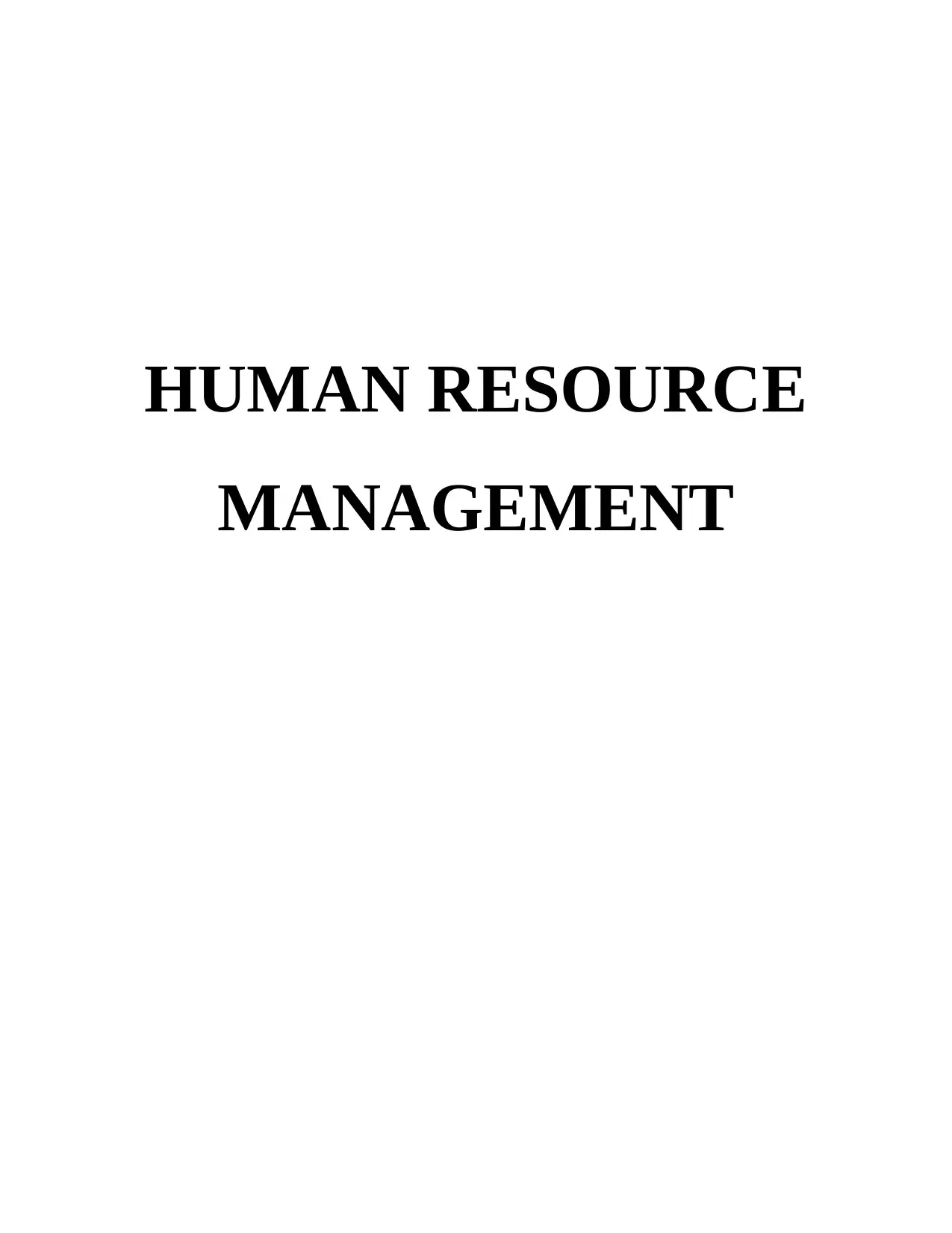
HUMAN RESOURCE
MANAGEMENT
MANAGEMENT
Paraphrase This Document
Need a fresh take? Get an instant paraphrase of this document with our AI Paraphraser
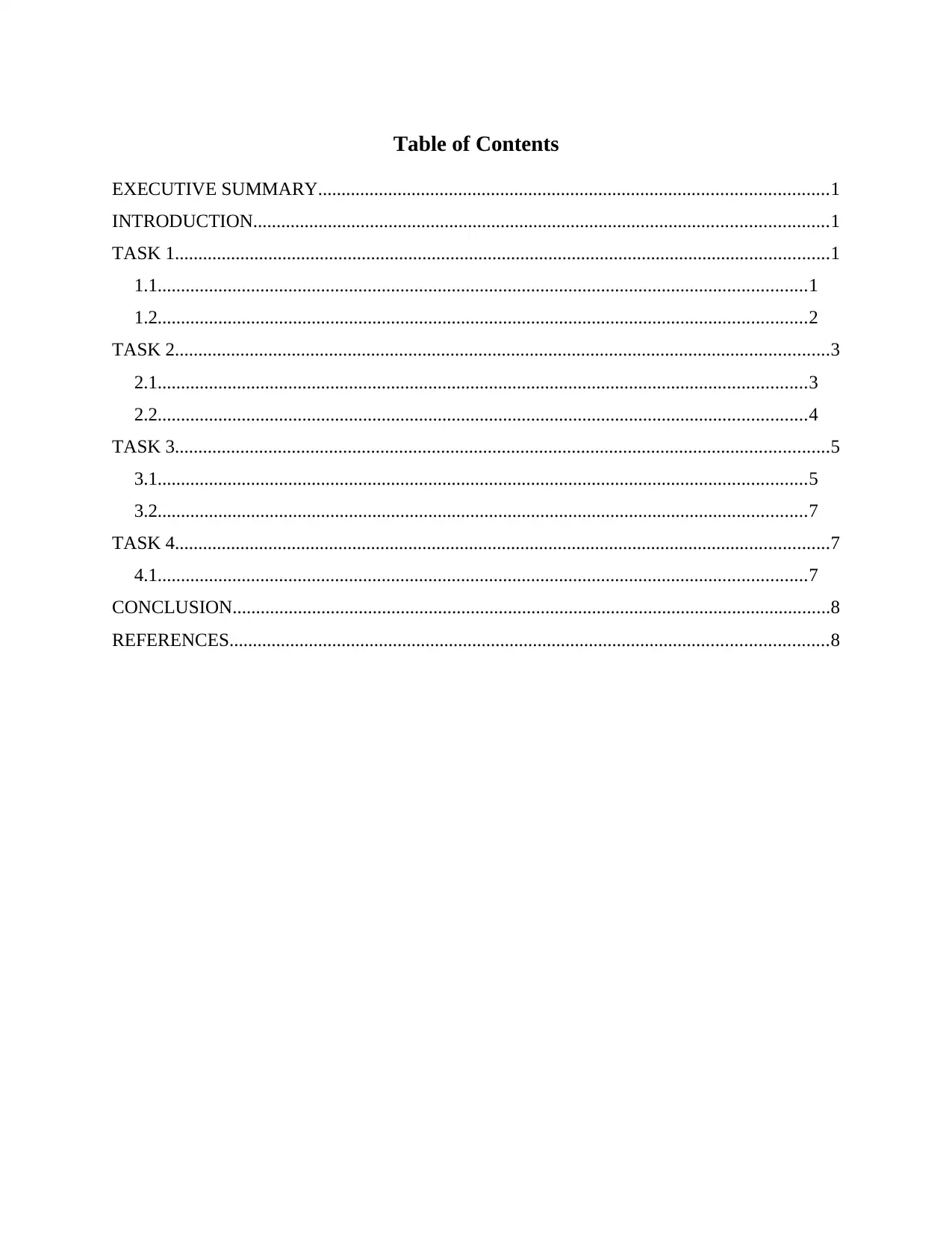
Table of Contents
EXECUTIVE SUMMARY.............................................................................................................1
INTRODUCTION...........................................................................................................................1
TASK 1............................................................................................................................................1
1.1...........................................................................................................................................1
1.2...........................................................................................................................................2
TASK 2............................................................................................................................................3
2.1...........................................................................................................................................3
2.2...........................................................................................................................................4
TASK 3............................................................................................................................................5
3.1...........................................................................................................................................5
3.2...........................................................................................................................................7
TASK 4............................................................................................................................................7
4.1...........................................................................................................................................7
CONCLUSION................................................................................................................................8
REFERENCES................................................................................................................................8
EXECUTIVE SUMMARY.............................................................................................................1
INTRODUCTION...........................................................................................................................1
TASK 1............................................................................................................................................1
1.1...........................................................................................................................................1
1.2...........................................................................................................................................2
TASK 2............................................................................................................................................3
2.1...........................................................................................................................................3
2.2...........................................................................................................................................4
TASK 3............................................................................................................................................5
3.1...........................................................................................................................................5
3.2...........................................................................................................................................7
TASK 4............................................................................................................................................7
4.1...........................................................................................................................................7
CONCLUSION................................................................................................................................8
REFERENCES................................................................................................................................8
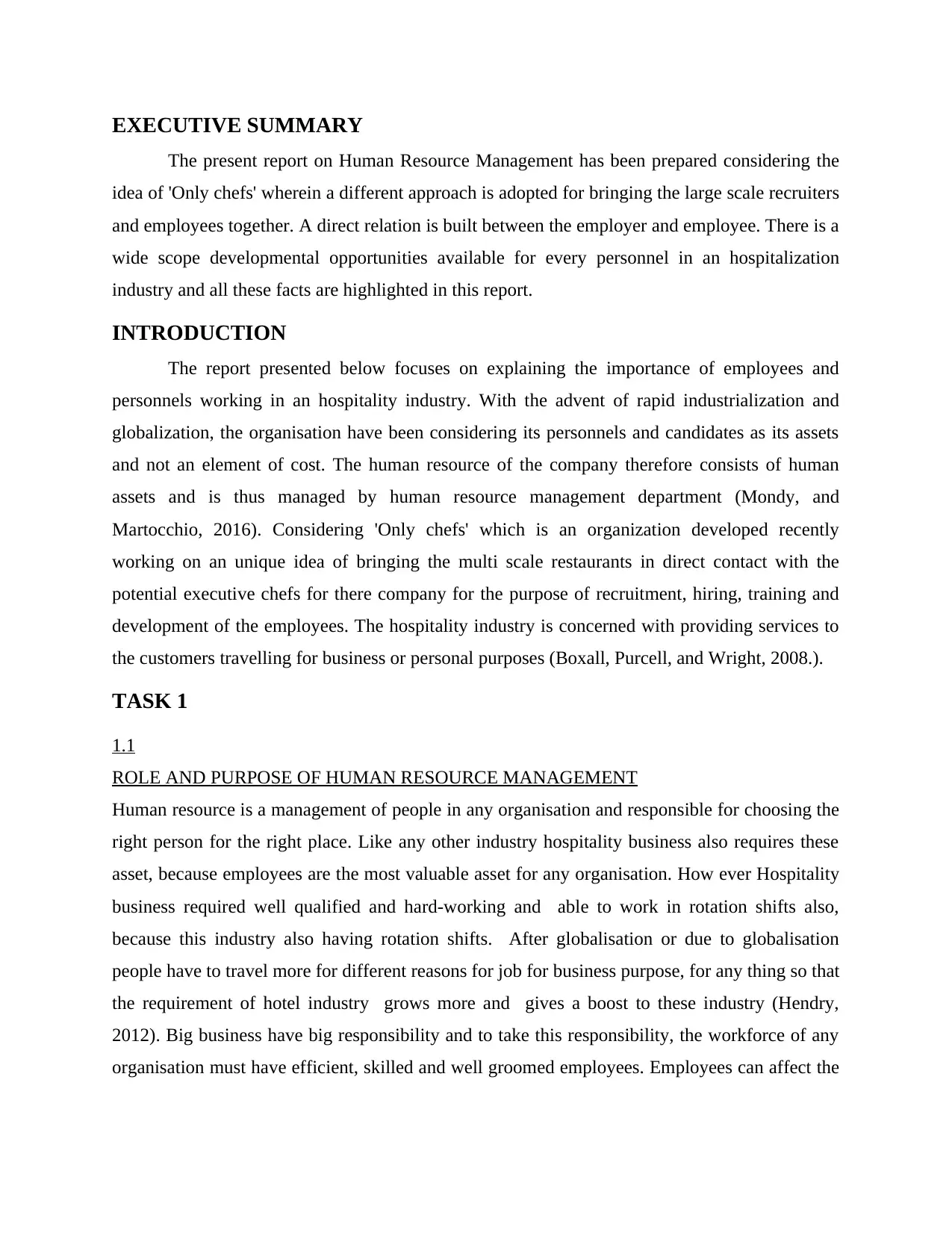
EXECUTIVE SUMMARY
The present report on Human Resource Management has been prepared considering the
idea of 'Only chefs' wherein a different approach is adopted for bringing the large scale recruiters
and employees together. A direct relation is built between the employer and employee. There is a
wide scope developmental opportunities available for every personnel in an hospitalization
industry and all these facts are highlighted in this report.
INTRODUCTION
The report presented below focuses on explaining the importance of employees and
personnels working in an hospitality industry. With the advent of rapid industrialization and
globalization, the organisation have been considering its personnels and candidates as its assets
and not an element of cost. The human resource of the company therefore consists of human
assets and is thus managed by human resource management department (Mondy, and
Martocchio, 2016). Considering 'Only chefs' which is an organization developed recently
working on an unique idea of bringing the multi scale restaurants in direct contact with the
potential executive chefs for there company for the purpose of recruitment, hiring, training and
development of the employees. The hospitality industry is concerned with providing services to
the customers travelling for business or personal purposes (Boxall, Purcell, and Wright, 2008.).
TASK 1
1.1
ROLE AND PURPOSE OF HUMAN RESOURCE MANAGEMENT
Human resource is a management of people in any organisation and responsible for choosing the
right person for the right place. Like any other industry hospitality business also requires these
asset, because employees are the most valuable asset for any organisation. How ever Hospitality
business required well qualified and hard-working and able to work in rotation shifts also,
because this industry also having rotation shifts. After globalisation or due to globalisation
people have to travel more for different reasons for job for business purpose, for any thing so that
the requirement of hotel industry grows more and gives a boost to these industry (Hendry,
2012). Big business have big responsibility and to take this responsibility, the workforce of any
organisation must have efficient, skilled and well groomed employees. Employees can affect the
The present report on Human Resource Management has been prepared considering the
idea of 'Only chefs' wherein a different approach is adopted for bringing the large scale recruiters
and employees together. A direct relation is built between the employer and employee. There is a
wide scope developmental opportunities available for every personnel in an hospitalization
industry and all these facts are highlighted in this report.
INTRODUCTION
The report presented below focuses on explaining the importance of employees and
personnels working in an hospitality industry. With the advent of rapid industrialization and
globalization, the organisation have been considering its personnels and candidates as its assets
and not an element of cost. The human resource of the company therefore consists of human
assets and is thus managed by human resource management department (Mondy, and
Martocchio, 2016). Considering 'Only chefs' which is an organization developed recently
working on an unique idea of bringing the multi scale restaurants in direct contact with the
potential executive chefs for there company for the purpose of recruitment, hiring, training and
development of the employees. The hospitality industry is concerned with providing services to
the customers travelling for business or personal purposes (Boxall, Purcell, and Wright, 2008.).
TASK 1
1.1
ROLE AND PURPOSE OF HUMAN RESOURCE MANAGEMENT
Human resource is a management of people in any organisation and responsible for choosing the
right person for the right place. Like any other industry hospitality business also requires these
asset, because employees are the most valuable asset for any organisation. How ever Hospitality
business required well qualified and hard-working and able to work in rotation shifts also,
because this industry also having rotation shifts. After globalisation or due to globalisation
people have to travel more for different reasons for job for business purpose, for any thing so that
the requirement of hotel industry grows more and gives a boost to these industry (Hendry,
2012). Big business have big responsibility and to take this responsibility, the workforce of any
organisation must have efficient, skilled and well groomed employees. Employees can affect the
⊘ This is a preview!⊘
Do you want full access?
Subscribe today to unlock all pages.

Trusted by 1+ million students worldwide
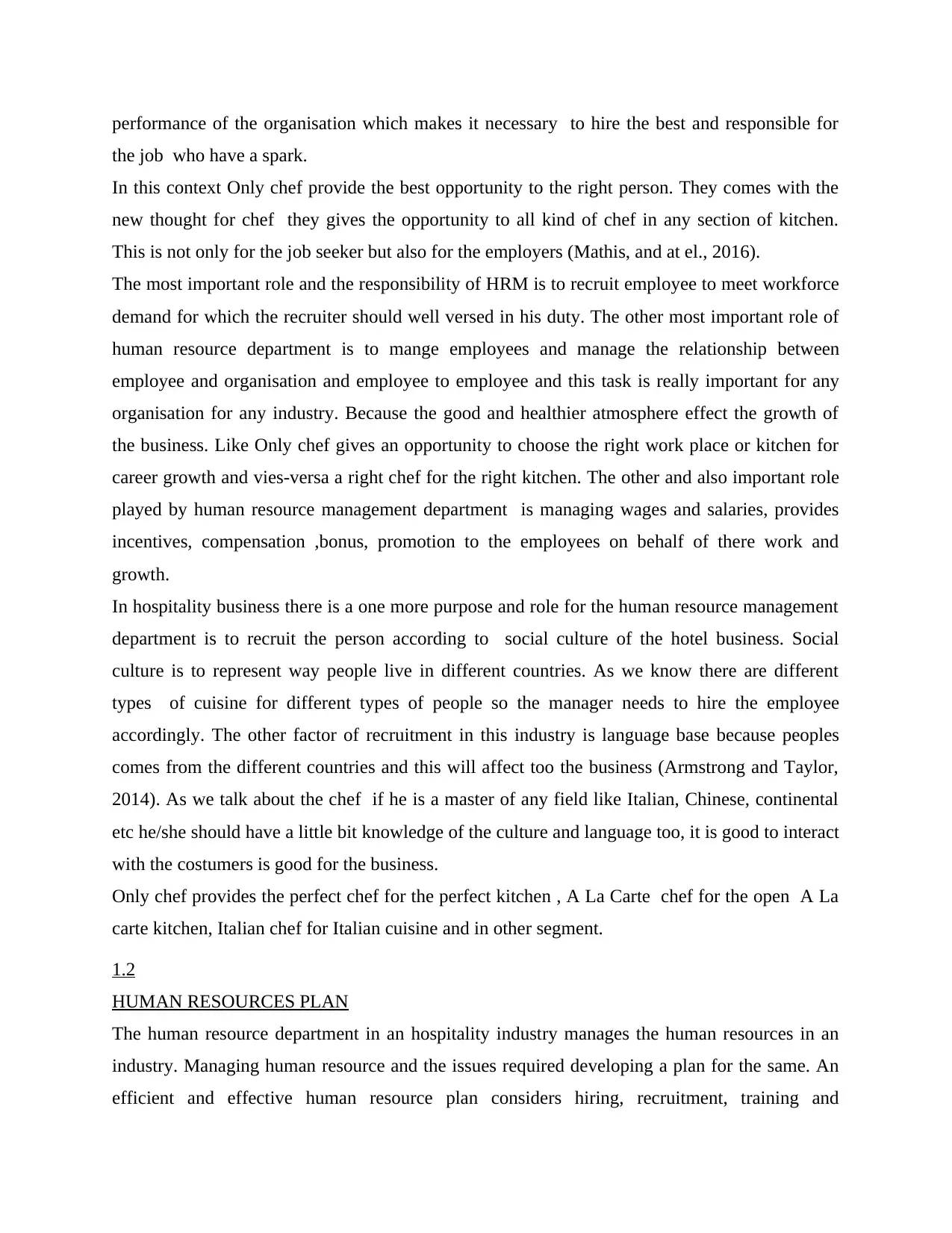
performance of the organisation which makes it necessary to hire the best and responsible for
the job who have a spark.
In this context Only chef provide the best opportunity to the right person. They comes with the
new thought for chef they gives the opportunity to all kind of chef in any section of kitchen.
This is not only for the job seeker but also for the employers (Mathis, and at el., 2016).
The most important role and the responsibility of HRM is to recruit employee to meet workforce
demand for which the recruiter should well versed in his duty. The other most important role of
human resource department is to mange employees and manage the relationship between
employee and organisation and employee to employee and this task is really important for any
organisation for any industry. Because the good and healthier atmosphere effect the growth of
the business. Like Only chef gives an opportunity to choose the right work place or kitchen for
career growth and vies-versa a right chef for the right kitchen. The other and also important role
played by human resource management department is managing wages and salaries, provides
incentives, compensation ,bonus, promotion to the employees on behalf of there work and
growth.
In hospitality business there is a one more purpose and role for the human resource management
department is to recruit the person according to social culture of the hotel business. Social
culture is to represent way people live in different countries. As we know there are different
types of cuisine for different types of people so the manager needs to hire the employee
accordingly. The other factor of recruitment in this industry is language base because peoples
comes from the different countries and this will affect too the business (Armstrong and Taylor,
2014). As we talk about the chef if he is a master of any field like Italian, Chinese, continental
etc he/she should have a little bit knowledge of the culture and language too, it is good to interact
with the costumers is good for the business.
Only chef provides the perfect chef for the perfect kitchen , A La Carte chef for the open A La
carte kitchen, Italian chef for Italian cuisine and in other segment.
1.2
HUMAN RESOURCES PLAN
The human resource department in an hospitality industry manages the human resources in an
industry. Managing human resource and the issues required developing a plan for the same. An
efficient and effective human resource plan considers hiring, recruitment, training and
the job who have a spark.
In this context Only chef provide the best opportunity to the right person. They comes with the
new thought for chef they gives the opportunity to all kind of chef in any section of kitchen.
This is not only for the job seeker but also for the employers (Mathis, and at el., 2016).
The most important role and the responsibility of HRM is to recruit employee to meet workforce
demand for which the recruiter should well versed in his duty. The other most important role of
human resource department is to mange employees and manage the relationship between
employee and organisation and employee to employee and this task is really important for any
organisation for any industry. Because the good and healthier atmosphere effect the growth of
the business. Like Only chef gives an opportunity to choose the right work place or kitchen for
career growth and vies-versa a right chef for the right kitchen. The other and also important role
played by human resource management department is managing wages and salaries, provides
incentives, compensation ,bonus, promotion to the employees on behalf of there work and
growth.
In hospitality business there is a one more purpose and role for the human resource management
department is to recruit the person according to social culture of the hotel business. Social
culture is to represent way people live in different countries. As we know there are different
types of cuisine for different types of people so the manager needs to hire the employee
accordingly. The other factor of recruitment in this industry is language base because peoples
comes from the different countries and this will affect too the business (Armstrong and Taylor,
2014). As we talk about the chef if he is a master of any field like Italian, Chinese, continental
etc he/she should have a little bit knowledge of the culture and language too, it is good to interact
with the costumers is good for the business.
Only chef provides the perfect chef for the perfect kitchen , A La Carte chef for the open A La
carte kitchen, Italian chef for Italian cuisine and in other segment.
1.2
HUMAN RESOURCES PLAN
The human resource department in an hospitality industry manages the human resources in an
industry. Managing human resource and the issues required developing a plan for the same. An
efficient and effective human resource plan considers hiring, recruitment, training and
Paraphrase This Document
Need a fresh take? Get an instant paraphrase of this document with our AI Paraphraser
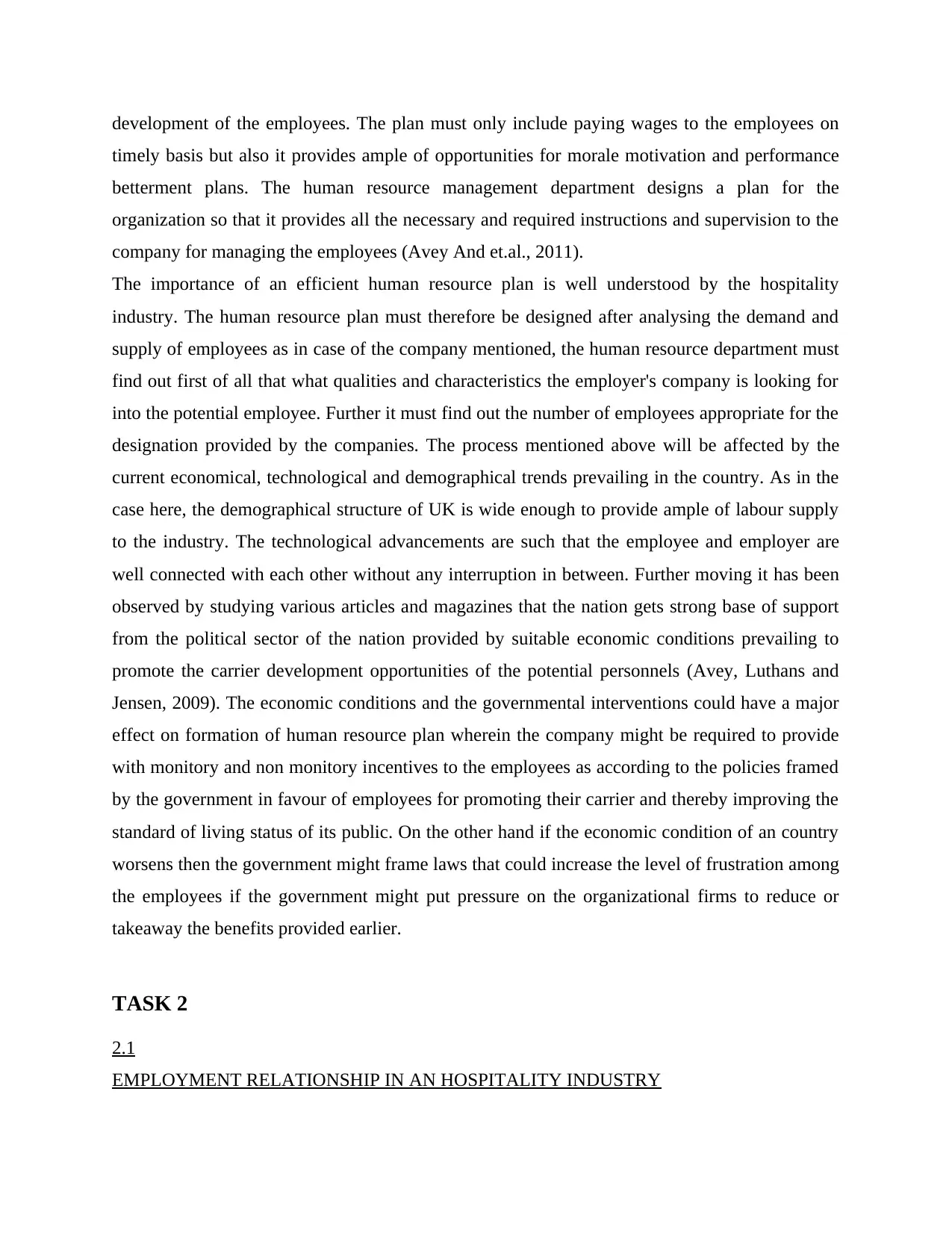
development of the employees. The plan must only include paying wages to the employees on
timely basis but also it provides ample of opportunities for morale motivation and performance
betterment plans. The human resource management department designs a plan for the
organization so that it provides all the necessary and required instructions and supervision to the
company for managing the employees (Avey And et.al., 2011).
The importance of an efficient human resource plan is well understood by the hospitality
industry. The human resource plan must therefore be designed after analysing the demand and
supply of employees as in case of the company mentioned, the human resource department must
find out first of all that what qualities and characteristics the employer's company is looking for
into the potential employee. Further it must find out the number of employees appropriate for the
designation provided by the companies. The process mentioned above will be affected by the
current economical, technological and demographical trends prevailing in the country. As in the
case here, the demographical structure of UK is wide enough to provide ample of labour supply
to the industry. The technological advancements are such that the employee and employer are
well connected with each other without any interruption in between. Further moving it has been
observed by studying various articles and magazines that the nation gets strong base of support
from the political sector of the nation provided by suitable economic conditions prevailing to
promote the carrier development opportunities of the potential personnels (Avey, Luthans and
Jensen, 2009). The economic conditions and the governmental interventions could have a major
effect on formation of human resource plan wherein the company might be required to provide
with monitory and non monitory incentives to the employees as according to the policies framed
by the government in favour of employees for promoting their carrier and thereby improving the
standard of living status of its public. On the other hand if the economic condition of an country
worsens then the government might frame laws that could increase the level of frustration among
the employees if the government might put pressure on the organizational firms to reduce or
takeaway the benefits provided earlier.
TASK 2
2.1
EMPLOYMENT RELATIONSHIP IN AN HOSPITALITY INDUSTRY
timely basis but also it provides ample of opportunities for morale motivation and performance
betterment plans. The human resource management department designs a plan for the
organization so that it provides all the necessary and required instructions and supervision to the
company for managing the employees (Avey And et.al., 2011).
The importance of an efficient human resource plan is well understood by the hospitality
industry. The human resource plan must therefore be designed after analysing the demand and
supply of employees as in case of the company mentioned, the human resource department must
find out first of all that what qualities and characteristics the employer's company is looking for
into the potential employee. Further it must find out the number of employees appropriate for the
designation provided by the companies. The process mentioned above will be affected by the
current economical, technological and demographical trends prevailing in the country. As in the
case here, the demographical structure of UK is wide enough to provide ample of labour supply
to the industry. The technological advancements are such that the employee and employer are
well connected with each other without any interruption in between. Further moving it has been
observed by studying various articles and magazines that the nation gets strong base of support
from the political sector of the nation provided by suitable economic conditions prevailing to
promote the carrier development opportunities of the potential personnels (Avey, Luthans and
Jensen, 2009). The economic conditions and the governmental interventions could have a major
effect on formation of human resource plan wherein the company might be required to provide
with monitory and non monitory incentives to the employees as according to the policies framed
by the government in favour of employees for promoting their carrier and thereby improving the
standard of living status of its public. On the other hand if the economic condition of an country
worsens then the government might frame laws that could increase the level of frustration among
the employees if the government might put pressure on the organizational firms to reduce or
takeaway the benefits provided earlier.
TASK 2
2.1
EMPLOYMENT RELATIONSHIP IN AN HOSPITALITY INDUSTRY
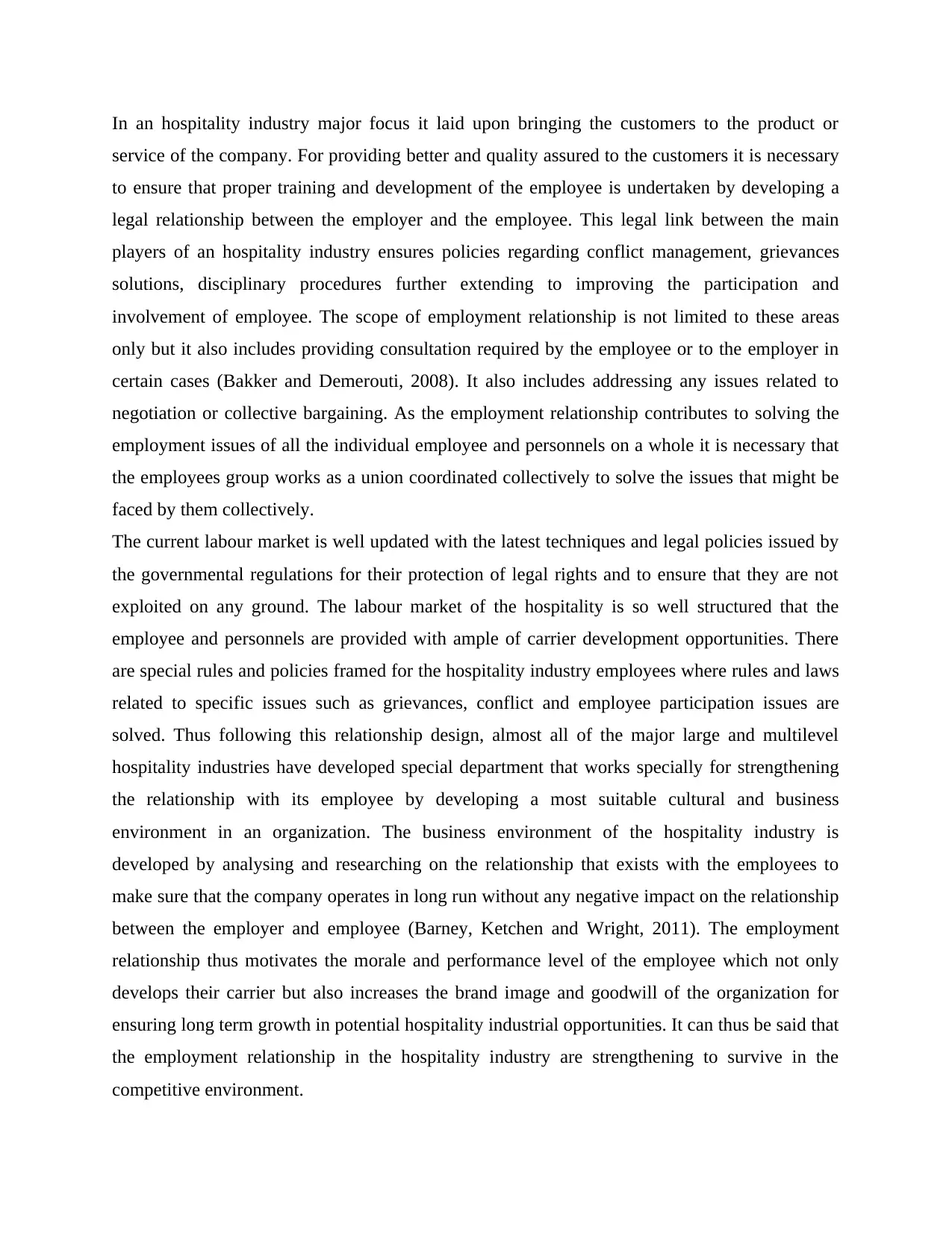
In an hospitality industry major focus it laid upon bringing the customers to the product or
service of the company. For providing better and quality assured to the customers it is necessary
to ensure that proper training and development of the employee is undertaken by developing a
legal relationship between the employer and the employee. This legal link between the main
players of an hospitality industry ensures policies regarding conflict management, grievances
solutions, disciplinary procedures further extending to improving the participation and
involvement of employee. The scope of employment relationship is not limited to these areas
only but it also includes providing consultation required by the employee or to the employer in
certain cases (Bakker and Demerouti, 2008). It also includes addressing any issues related to
negotiation or collective bargaining. As the employment relationship contributes to solving the
employment issues of all the individual employee and personnels on a whole it is necessary that
the employees group works as a union coordinated collectively to solve the issues that might be
faced by them collectively.
The current labour market is well updated with the latest techniques and legal policies issued by
the governmental regulations for their protection of legal rights and to ensure that they are not
exploited on any ground. The labour market of the hospitality is so well structured that the
employee and personnels are provided with ample of carrier development opportunities. There
are special rules and policies framed for the hospitality industry employees where rules and laws
related to specific issues such as grievances, conflict and employee participation issues are
solved. Thus following this relationship design, almost all of the major large and multilevel
hospitality industries have developed special department that works specially for strengthening
the relationship with its employee by developing a most suitable cultural and business
environment in an organization. The business environment of the hospitality industry is
developed by analysing and researching on the relationship that exists with the employees to
make sure that the company operates in long run without any negative impact on the relationship
between the employer and employee (Barney, Ketchen and Wright, 2011). The employment
relationship thus motivates the morale and performance level of the employee which not only
develops their carrier but also increases the brand image and goodwill of the organization for
ensuring long term growth in potential hospitality industrial opportunities. It can thus be said that
the employment relationship in the hospitality industry are strengthening to survive in the
competitive environment.
service of the company. For providing better and quality assured to the customers it is necessary
to ensure that proper training and development of the employee is undertaken by developing a
legal relationship between the employer and the employee. This legal link between the main
players of an hospitality industry ensures policies regarding conflict management, grievances
solutions, disciplinary procedures further extending to improving the participation and
involvement of employee. The scope of employment relationship is not limited to these areas
only but it also includes providing consultation required by the employee or to the employer in
certain cases (Bakker and Demerouti, 2008). It also includes addressing any issues related to
negotiation or collective bargaining. As the employment relationship contributes to solving the
employment issues of all the individual employee and personnels on a whole it is necessary that
the employees group works as a union coordinated collectively to solve the issues that might be
faced by them collectively.
The current labour market is well updated with the latest techniques and legal policies issued by
the governmental regulations for their protection of legal rights and to ensure that they are not
exploited on any ground. The labour market of the hospitality is so well structured that the
employee and personnels are provided with ample of carrier development opportunities. There
are special rules and policies framed for the hospitality industry employees where rules and laws
related to specific issues such as grievances, conflict and employee participation issues are
solved. Thus following this relationship design, almost all of the major large and multilevel
hospitality industries have developed special department that works specially for strengthening
the relationship with its employee by developing a most suitable cultural and business
environment in an organization. The business environment of the hospitality industry is
developed by analysing and researching on the relationship that exists with the employees to
make sure that the company operates in long run without any negative impact on the relationship
between the employer and employee (Barney, Ketchen and Wright, 2011). The employment
relationship thus motivates the morale and performance level of the employee which not only
develops their carrier but also increases the brand image and goodwill of the organization for
ensuring long term growth in potential hospitality industrial opportunities. It can thus be said that
the employment relationship in the hospitality industry are strengthening to survive in the
competitive environment.
⊘ This is a preview!⊘
Do you want full access?
Subscribe today to unlock all pages.

Trusted by 1+ million students worldwide
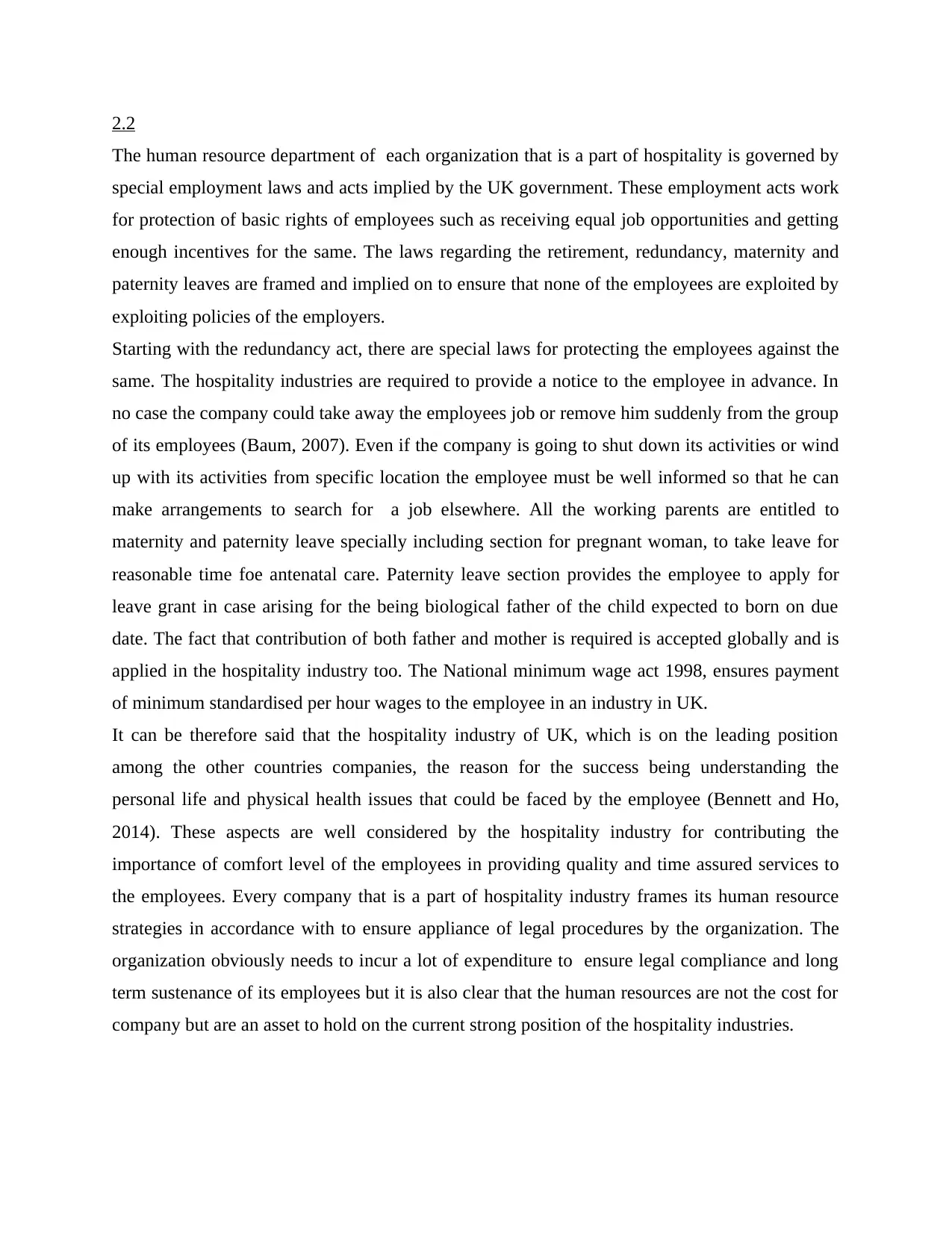
2.2
The human resource department of each organization that is a part of hospitality is governed by
special employment laws and acts implied by the UK government. These employment acts work
for protection of basic rights of employees such as receiving equal job opportunities and getting
enough incentives for the same. The laws regarding the retirement, redundancy, maternity and
paternity leaves are framed and implied on to ensure that none of the employees are exploited by
exploiting policies of the employers.
Starting with the redundancy act, there are special laws for protecting the employees against the
same. The hospitality industries are required to provide a notice to the employee in advance. In
no case the company could take away the employees job or remove him suddenly from the group
of its employees (Baum, 2007). Even if the company is going to shut down its activities or wind
up with its activities from specific location the employee must be well informed so that he can
make arrangements to search for a job elsewhere. All the working parents are entitled to
maternity and paternity leave specially including section for pregnant woman, to take leave for
reasonable time foe antenatal care. Paternity leave section provides the employee to apply for
leave grant in case arising for the being biological father of the child expected to born on due
date. The fact that contribution of both father and mother is required is accepted globally and is
applied in the hospitality industry too. The National minimum wage act 1998, ensures payment
of minimum standardised per hour wages to the employee in an industry in UK.
It can be therefore said that the hospitality industry of UK, which is on the leading position
among the other countries companies, the reason for the success being understanding the
personal life and physical health issues that could be faced by the employee (Bennett and Ho,
2014). These aspects are well considered by the hospitality industry for contributing the
importance of comfort level of the employees in providing quality and time assured services to
the employees. Every company that is a part of hospitality industry frames its human resource
strategies in accordance with to ensure appliance of legal procedures by the organization. The
organization obviously needs to incur a lot of expenditure to ensure legal compliance and long
term sustenance of its employees but it is also clear that the human resources are not the cost for
company but are an asset to hold on the current strong position of the hospitality industries.
The human resource department of each organization that is a part of hospitality is governed by
special employment laws and acts implied by the UK government. These employment acts work
for protection of basic rights of employees such as receiving equal job opportunities and getting
enough incentives for the same. The laws regarding the retirement, redundancy, maternity and
paternity leaves are framed and implied on to ensure that none of the employees are exploited by
exploiting policies of the employers.
Starting with the redundancy act, there are special laws for protecting the employees against the
same. The hospitality industries are required to provide a notice to the employee in advance. In
no case the company could take away the employees job or remove him suddenly from the group
of its employees (Baum, 2007). Even if the company is going to shut down its activities or wind
up with its activities from specific location the employee must be well informed so that he can
make arrangements to search for a job elsewhere. All the working parents are entitled to
maternity and paternity leave specially including section for pregnant woman, to take leave for
reasonable time foe antenatal care. Paternity leave section provides the employee to apply for
leave grant in case arising for the being biological father of the child expected to born on due
date. The fact that contribution of both father and mother is required is accepted globally and is
applied in the hospitality industry too. The National minimum wage act 1998, ensures payment
of minimum standardised per hour wages to the employee in an industry in UK.
It can be therefore said that the hospitality industry of UK, which is on the leading position
among the other countries companies, the reason for the success being understanding the
personal life and physical health issues that could be faced by the employee (Bennett and Ho,
2014). These aspects are well considered by the hospitality industry for contributing the
importance of comfort level of the employees in providing quality and time assured services to
the employees. Every company that is a part of hospitality industry frames its human resource
strategies in accordance with to ensure appliance of legal procedures by the organization. The
organization obviously needs to incur a lot of expenditure to ensure legal compliance and long
term sustenance of its employees but it is also clear that the human resources are not the cost for
company but are an asset to hold on the current strong position of the hospitality industries.
Paraphrase This Document
Need a fresh take? Get an instant paraphrase of this document with our AI Paraphraser
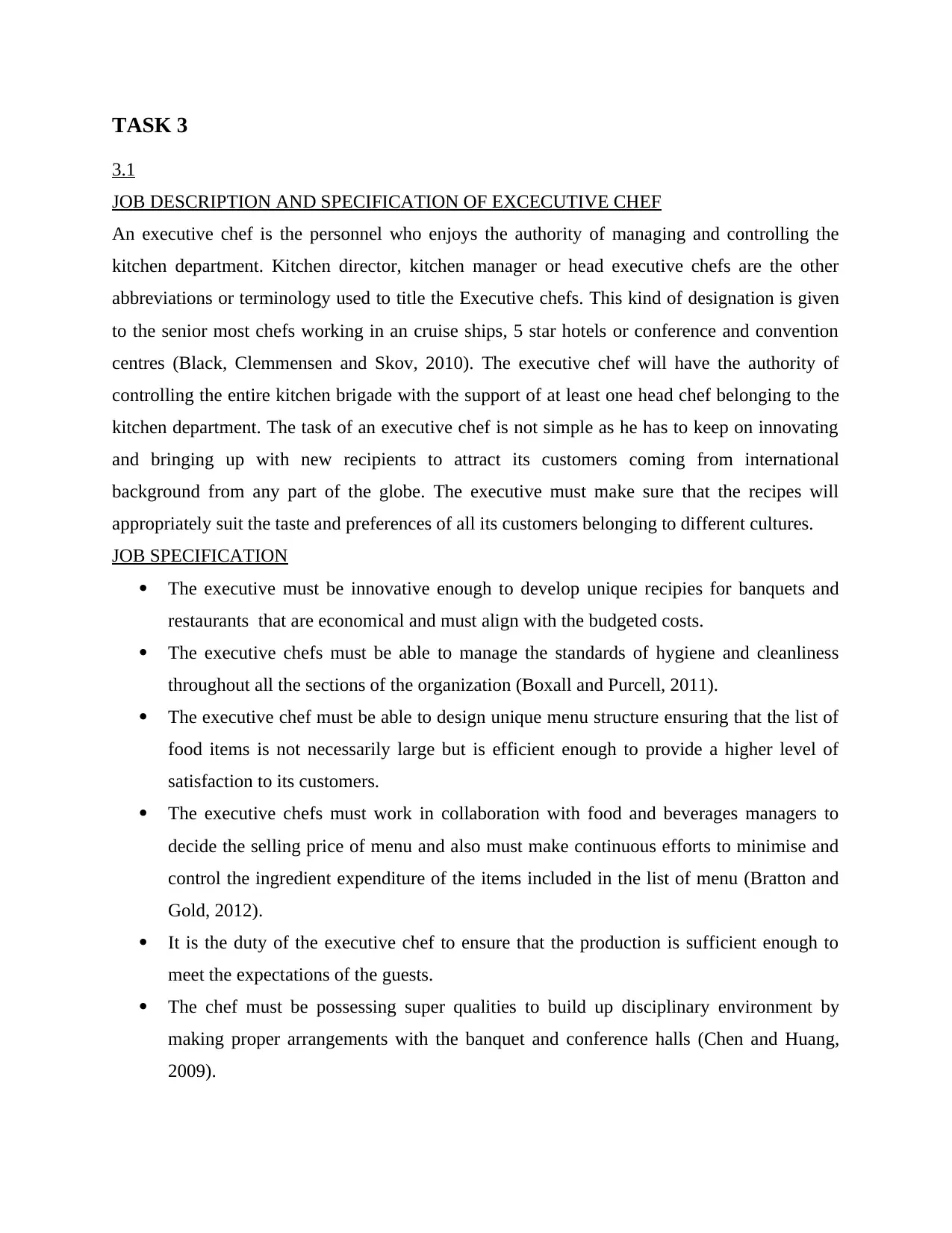
TASK 3
3.1
JOB DESCRIPTION AND SPECIFICATION OF EXCECUTIVE CHEF
An executive chef is the personnel who enjoys the authority of managing and controlling the
kitchen department. Kitchen director, kitchen manager or head executive chefs are the other
abbreviations or terminology used to title the Executive chefs. This kind of designation is given
to the senior most chefs working in an cruise ships, 5 star hotels or conference and convention
centres (Black, Clemmensen and Skov, 2010). The executive chef will have the authority of
controlling the entire kitchen brigade with the support of at least one head chef belonging to the
kitchen department. The task of an executive chef is not simple as he has to keep on innovating
and bringing up with new recipients to attract its customers coming from international
background from any part of the globe. The executive must make sure that the recipes will
appropriately suit the taste and preferences of all its customers belonging to different cultures.
JOB SPECIFICATION
The executive must be innovative enough to develop unique recipies for banquets and
restaurants that are economical and must align with the budgeted costs.
The executive chefs must be able to manage the standards of hygiene and cleanliness
throughout all the sections of the organization (Boxall and Purcell, 2011).
The executive chef must be able to design unique menu structure ensuring that the list of
food items is not necessarily large but is efficient enough to provide a higher level of
satisfaction to its customers.
The executive chefs must work in collaboration with food and beverages managers to
decide the selling price of menu and also must make continuous efforts to minimise and
control the ingredient expenditure of the items included in the list of menu (Bratton and
Gold, 2012).
It is the duty of the executive chef to ensure that the production is sufficient enough to
meet the expectations of the guests.
The chef must be possessing super qualities to build up disciplinary environment by
making proper arrangements with the banquet and conference halls (Chen and Huang,
2009).
3.1
JOB DESCRIPTION AND SPECIFICATION OF EXCECUTIVE CHEF
An executive chef is the personnel who enjoys the authority of managing and controlling the
kitchen department. Kitchen director, kitchen manager or head executive chefs are the other
abbreviations or terminology used to title the Executive chefs. This kind of designation is given
to the senior most chefs working in an cruise ships, 5 star hotels or conference and convention
centres (Black, Clemmensen and Skov, 2010). The executive chef will have the authority of
controlling the entire kitchen brigade with the support of at least one head chef belonging to the
kitchen department. The task of an executive chef is not simple as he has to keep on innovating
and bringing up with new recipients to attract its customers coming from international
background from any part of the globe. The executive must make sure that the recipes will
appropriately suit the taste and preferences of all its customers belonging to different cultures.
JOB SPECIFICATION
The executive must be innovative enough to develop unique recipies for banquets and
restaurants that are economical and must align with the budgeted costs.
The executive chefs must be able to manage the standards of hygiene and cleanliness
throughout all the sections of the organization (Boxall and Purcell, 2011).
The executive chef must be able to design unique menu structure ensuring that the list of
food items is not necessarily large but is efficient enough to provide a higher level of
satisfaction to its customers.
The executive chefs must work in collaboration with food and beverages managers to
decide the selling price of menu and also must make continuous efforts to minimise and
control the ingredient expenditure of the items included in the list of menu (Bratton and
Gold, 2012).
It is the duty of the executive chef to ensure that the production is sufficient enough to
meet the expectations of the guests.
The chef must be possessing super qualities to build up disciplinary environment by
making proper arrangements with the banquet and conference halls (Chen and Huang,
2009).
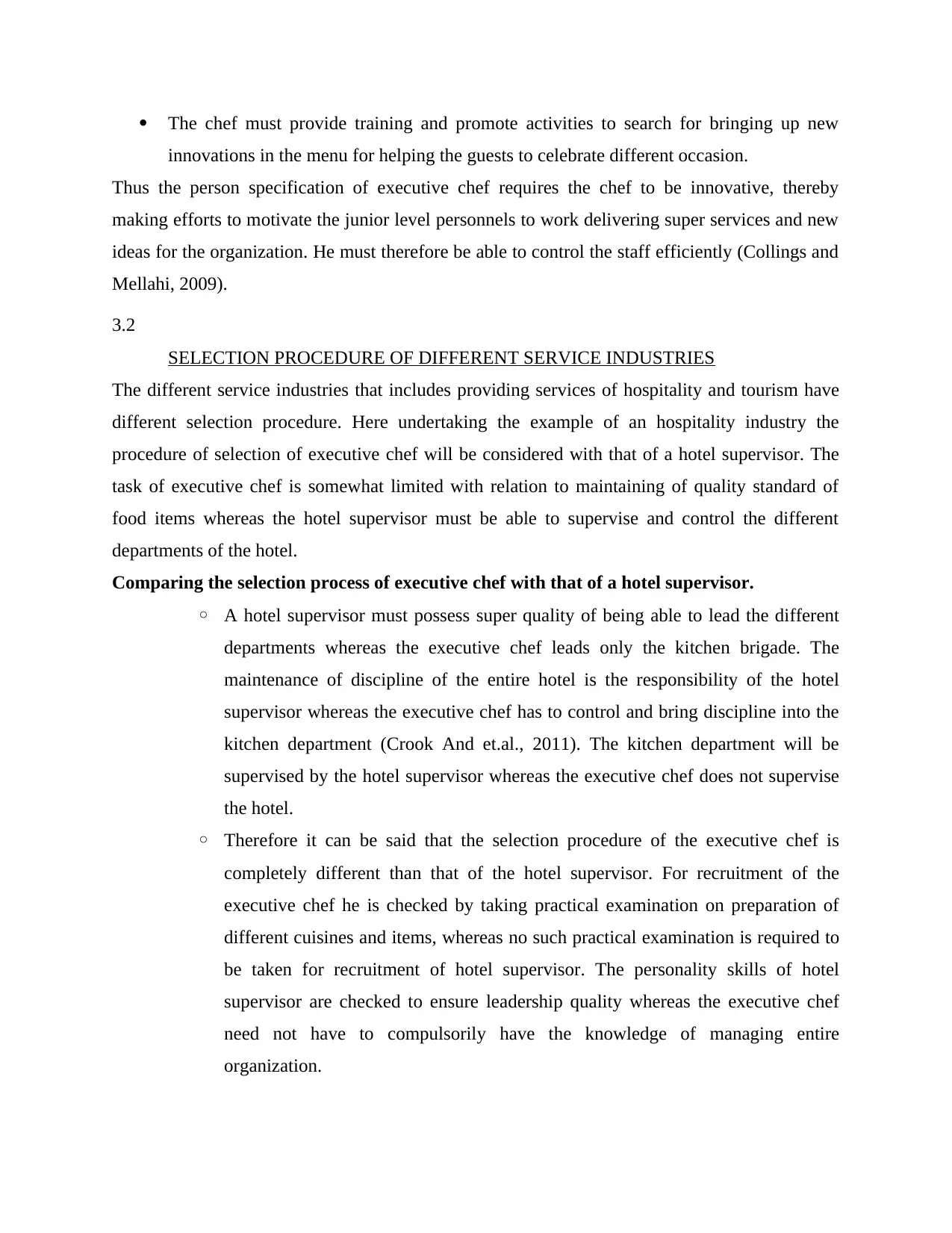
The chef must provide training and promote activities to search for bringing up new
innovations in the menu for helping the guests to celebrate different occasion.
Thus the person specification of executive chef requires the chef to be innovative, thereby
making efforts to motivate the junior level personnels to work delivering super services and new
ideas for the organization. He must therefore be able to control the staff efficiently (Collings and
Mellahi, 2009).
3.2
SELECTION PROCEDURE OF DIFFERENT SERVICE INDUSTRIES
The different service industries that includes providing services of hospitality and tourism have
different selection procedure. Here undertaking the example of an hospitality industry the
procedure of selection of executive chef will be considered with that of a hotel supervisor. The
task of executive chef is somewhat limited with relation to maintaining of quality standard of
food items whereas the hotel supervisor must be able to supervise and control the different
departments of the hotel.
Comparing the selection process of executive chef with that of a hotel supervisor.
◦ A hotel supervisor must possess super quality of being able to lead the different
departments whereas the executive chef leads only the kitchen brigade. The
maintenance of discipline of the entire hotel is the responsibility of the hotel
supervisor whereas the executive chef has to control and bring discipline into the
kitchen department (Crook And et.al., 2011). The kitchen department will be
supervised by the hotel supervisor whereas the executive chef does not supervise
the hotel.
◦ Therefore it can be said that the selection procedure of the executive chef is
completely different than that of the hotel supervisor. For recruitment of the
executive chef he is checked by taking practical examination on preparation of
different cuisines and items, whereas no such practical examination is required to
be taken for recruitment of hotel supervisor. The personality skills of hotel
supervisor are checked to ensure leadership quality whereas the executive chef
need not have to compulsorily have the knowledge of managing entire
organization.
innovations in the menu for helping the guests to celebrate different occasion.
Thus the person specification of executive chef requires the chef to be innovative, thereby
making efforts to motivate the junior level personnels to work delivering super services and new
ideas for the organization. He must therefore be able to control the staff efficiently (Collings and
Mellahi, 2009).
3.2
SELECTION PROCEDURE OF DIFFERENT SERVICE INDUSTRIES
The different service industries that includes providing services of hospitality and tourism have
different selection procedure. Here undertaking the example of an hospitality industry the
procedure of selection of executive chef will be considered with that of a hotel supervisor. The
task of executive chef is somewhat limited with relation to maintaining of quality standard of
food items whereas the hotel supervisor must be able to supervise and control the different
departments of the hotel.
Comparing the selection process of executive chef with that of a hotel supervisor.
◦ A hotel supervisor must possess super quality of being able to lead the different
departments whereas the executive chef leads only the kitchen brigade. The
maintenance of discipline of the entire hotel is the responsibility of the hotel
supervisor whereas the executive chef has to control and bring discipline into the
kitchen department (Crook And et.al., 2011). The kitchen department will be
supervised by the hotel supervisor whereas the executive chef does not supervise
the hotel.
◦ Therefore it can be said that the selection procedure of the executive chef is
completely different than that of the hotel supervisor. For recruitment of the
executive chef he is checked by taking practical examination on preparation of
different cuisines and items, whereas no such practical examination is required to
be taken for recruitment of hotel supervisor. The personality skills of hotel
supervisor are checked to ensure leadership quality whereas the executive chef
need not have to compulsorily have the knowledge of managing entire
organization.
⊘ This is a preview!⊘
Do you want full access?
Subscribe today to unlock all pages.

Trusted by 1+ million students worldwide
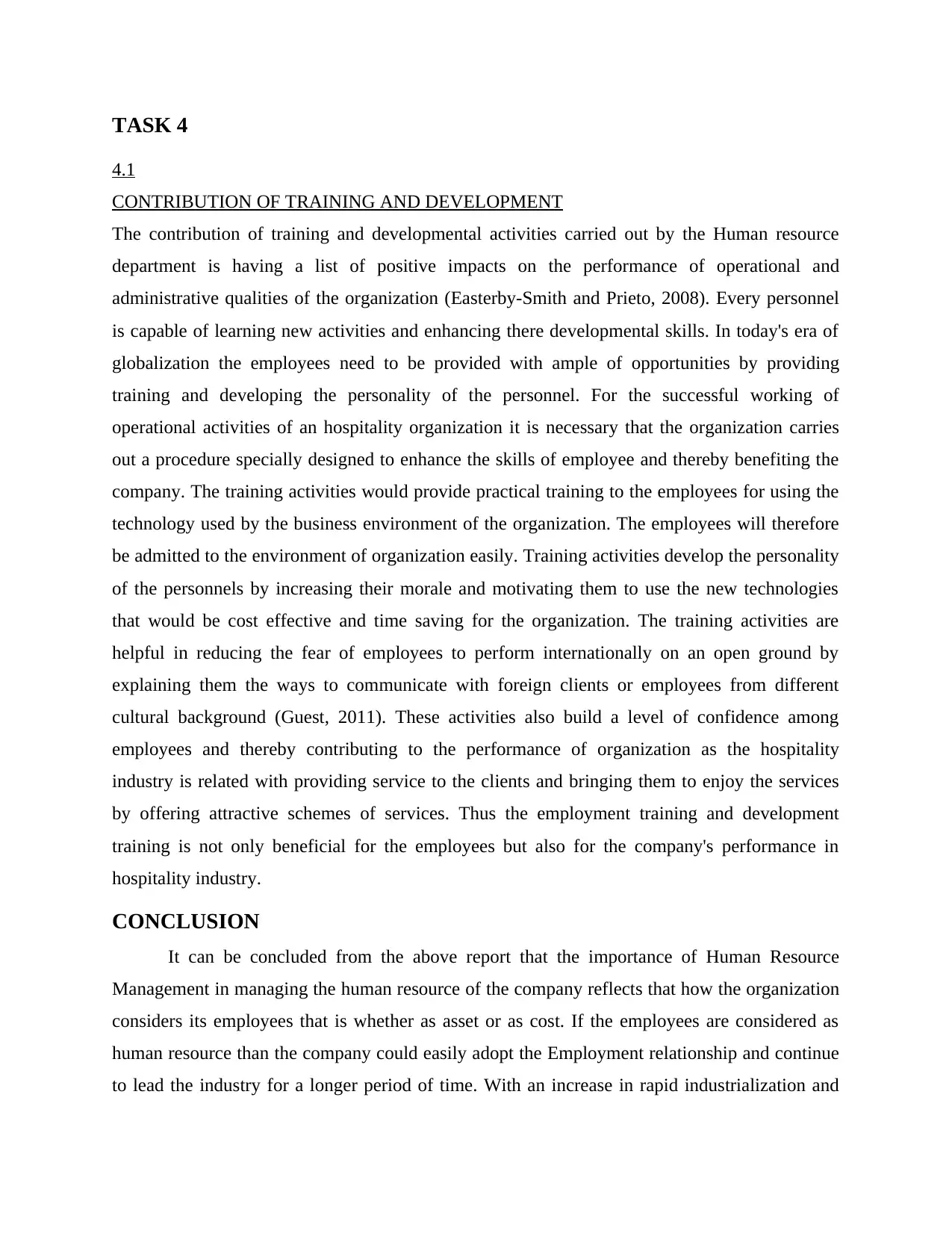
TASK 4
4.1
CONTRIBUTION OF TRAINING AND DEVELOPMENT
The contribution of training and developmental activities carried out by the Human resource
department is having a list of positive impacts on the performance of operational and
administrative qualities of the organization (Easterby-Smith and Prieto, 2008). Every personnel
is capable of learning new activities and enhancing there developmental skills. In today's era of
globalization the employees need to be provided with ample of opportunities by providing
training and developing the personality of the personnel. For the successful working of
operational activities of an hospitality organization it is necessary that the organization carries
out a procedure specially designed to enhance the skills of employee and thereby benefiting the
company. The training activities would provide practical training to the employees for using the
technology used by the business environment of the organization. The employees will therefore
be admitted to the environment of organization easily. Training activities develop the personality
of the personnels by increasing their morale and motivating them to use the new technologies
that would be cost effective and time saving for the organization. The training activities are
helpful in reducing the fear of employees to perform internationally on an open ground by
explaining them the ways to communicate with foreign clients or employees from different
cultural background (Guest, 2011). These activities also build a level of confidence among
employees and thereby contributing to the performance of organization as the hospitality
industry is related with providing service to the clients and bringing them to enjoy the services
by offering attractive schemes of services. Thus the employment training and development
training is not only beneficial for the employees but also for the company's performance in
hospitality industry.
CONCLUSION
It can be concluded from the above report that the importance of Human Resource
Management in managing the human resource of the company reflects that how the organization
considers its employees that is whether as asset or as cost. If the employees are considered as
human resource than the company could easily adopt the Employment relationship and continue
to lead the industry for a longer period of time. With an increase in rapid industrialization and
4.1
CONTRIBUTION OF TRAINING AND DEVELOPMENT
The contribution of training and developmental activities carried out by the Human resource
department is having a list of positive impacts on the performance of operational and
administrative qualities of the organization (Easterby-Smith and Prieto, 2008). Every personnel
is capable of learning new activities and enhancing there developmental skills. In today's era of
globalization the employees need to be provided with ample of opportunities by providing
training and developing the personality of the personnel. For the successful working of
operational activities of an hospitality organization it is necessary that the organization carries
out a procedure specially designed to enhance the skills of employee and thereby benefiting the
company. The training activities would provide practical training to the employees for using the
technology used by the business environment of the organization. The employees will therefore
be admitted to the environment of organization easily. Training activities develop the personality
of the personnels by increasing their morale and motivating them to use the new technologies
that would be cost effective and time saving for the organization. The training activities are
helpful in reducing the fear of employees to perform internationally on an open ground by
explaining them the ways to communicate with foreign clients or employees from different
cultural background (Guest, 2011). These activities also build a level of confidence among
employees and thereby contributing to the performance of organization as the hospitality
industry is related with providing service to the clients and bringing them to enjoy the services
by offering attractive schemes of services. Thus the employment training and development
training is not only beneficial for the employees but also for the company's performance in
hospitality industry.
CONCLUSION
It can be concluded from the above report that the importance of Human Resource
Management in managing the human resource of the company reflects that how the organization
considers its employees that is whether as asset or as cost. If the employees are considered as
human resource than the company could easily adopt the Employment relationship and continue
to lead the industry for a longer period of time. With an increase in rapid industrialization and
Paraphrase This Document
Need a fresh take? Get an instant paraphrase of this document with our AI Paraphraser
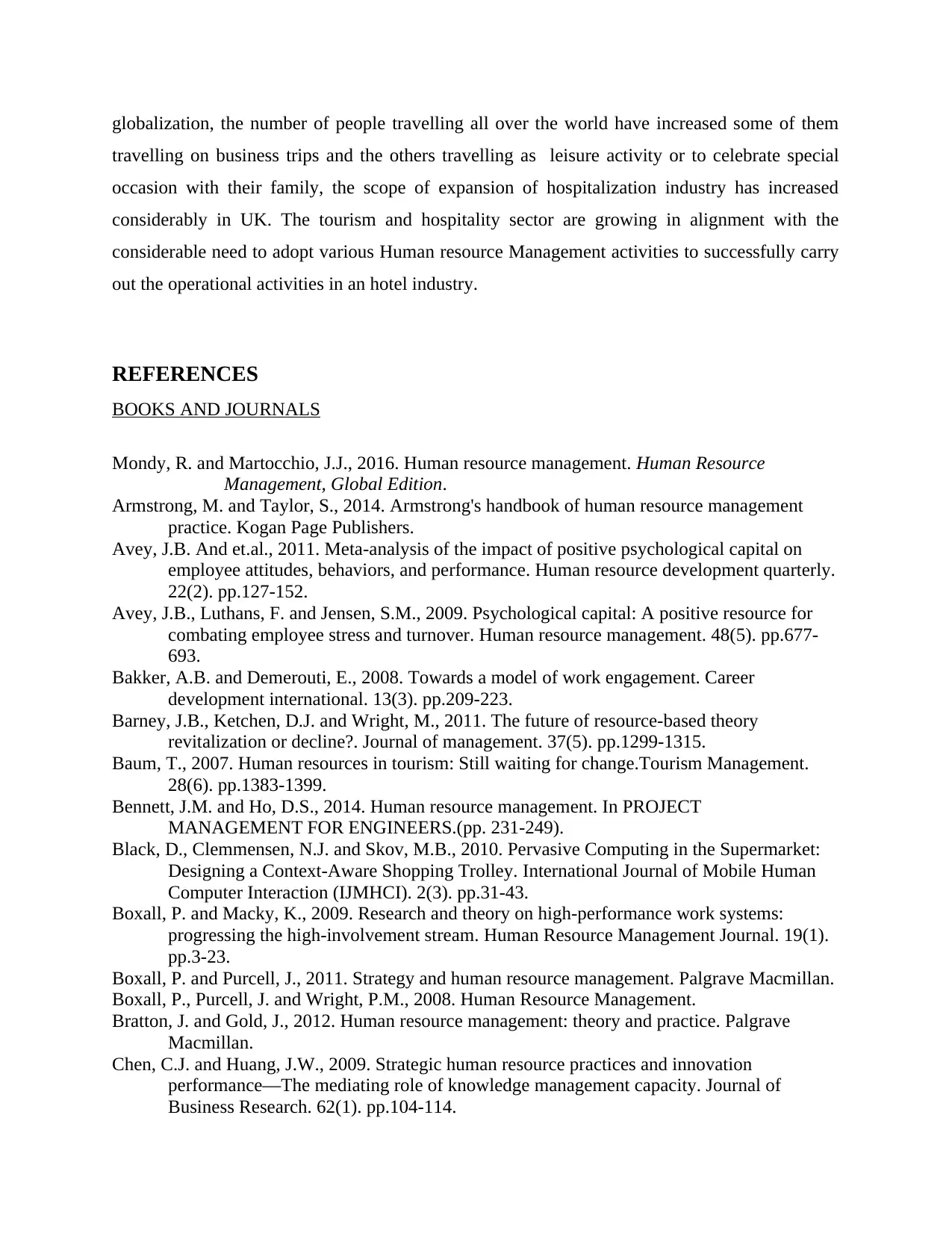
globalization, the number of people travelling all over the world have increased some of them
travelling on business trips and the others travelling as leisure activity or to celebrate special
occasion with their family, the scope of expansion of hospitalization industry has increased
considerably in UK. The tourism and hospitality sector are growing in alignment with the
considerable need to adopt various Human resource Management activities to successfully carry
out the operational activities in an hotel industry.
REFERENCES
BOOKS AND JOURNALS
Mondy, R. and Martocchio, J.J., 2016. Human resource management. Human Resource
Management, Global Edition.
Armstrong, M. and Taylor, S., 2014. Armstrong's handbook of human resource management
practice. Kogan Page Publishers.
Avey, J.B. And et.al., 2011. Meta-analysis of the impact of positive psychological capital on
employee attitudes, behaviors, and performance. Human resource development quarterly.
22(2). pp.127-152.
Avey, J.B., Luthans, F. and Jensen, S.M., 2009. Psychological capital: A positive resource for
combating employee stress and turnover. Human resource management. 48(5). pp.677-
693.
Bakker, A.B. and Demerouti, E., 2008. Towards a model of work engagement. Career
development international. 13(3). pp.209-223.
Barney, J.B., Ketchen, D.J. and Wright, M., 2011. The future of resource-based theory
revitalization or decline?. Journal of management. 37(5). pp.1299-1315.
Baum, T., 2007. Human resources in tourism: Still waiting for change.Tourism Management.
28(6). pp.1383-1399.
Bennett, J.M. and Ho, D.S., 2014. Human resource management. In PROJECT
MANAGEMENT FOR ENGINEERS.(pp. 231-249).
Black, D., Clemmensen, N.J. and Skov, M.B., 2010. Pervasive Computing in the Supermarket:
Designing a Context-Aware Shopping Trolley. International Journal of Mobile Human
Computer Interaction (IJMHCI). 2(3). pp.31-43.
Boxall, P. and Macky, K., 2009. Research and theory on high-performance work systems:
progressing the high-involvement stream. Human Resource Management Journal. 19(1).
pp.3-23.
Boxall, P. and Purcell, J., 2011. Strategy and human resource management. Palgrave Macmillan.
Boxall, P., Purcell, J. and Wright, P.M., 2008. Human Resource Management.
Bratton, J. and Gold, J., 2012. Human resource management: theory and practice. Palgrave
Macmillan.
Chen, C.J. and Huang, J.W., 2009. Strategic human resource practices and innovation
performance—The mediating role of knowledge management capacity. Journal of
Business Research. 62(1). pp.104-114.
travelling on business trips and the others travelling as leisure activity or to celebrate special
occasion with their family, the scope of expansion of hospitalization industry has increased
considerably in UK. The tourism and hospitality sector are growing in alignment with the
considerable need to adopt various Human resource Management activities to successfully carry
out the operational activities in an hotel industry.
REFERENCES
BOOKS AND JOURNALS
Mondy, R. and Martocchio, J.J., 2016. Human resource management. Human Resource
Management, Global Edition.
Armstrong, M. and Taylor, S., 2014. Armstrong's handbook of human resource management
practice. Kogan Page Publishers.
Avey, J.B. And et.al., 2011. Meta-analysis of the impact of positive psychological capital on
employee attitudes, behaviors, and performance. Human resource development quarterly.
22(2). pp.127-152.
Avey, J.B., Luthans, F. and Jensen, S.M., 2009. Psychological capital: A positive resource for
combating employee stress and turnover. Human resource management. 48(5). pp.677-
693.
Bakker, A.B. and Demerouti, E., 2008. Towards a model of work engagement. Career
development international. 13(3). pp.209-223.
Barney, J.B., Ketchen, D.J. and Wright, M., 2011. The future of resource-based theory
revitalization or decline?. Journal of management. 37(5). pp.1299-1315.
Baum, T., 2007. Human resources in tourism: Still waiting for change.Tourism Management.
28(6). pp.1383-1399.
Bennett, J.M. and Ho, D.S., 2014. Human resource management. In PROJECT
MANAGEMENT FOR ENGINEERS.(pp. 231-249).
Black, D., Clemmensen, N.J. and Skov, M.B., 2010. Pervasive Computing in the Supermarket:
Designing a Context-Aware Shopping Trolley. International Journal of Mobile Human
Computer Interaction (IJMHCI). 2(3). pp.31-43.
Boxall, P. and Macky, K., 2009. Research and theory on high-performance work systems:
progressing the high-involvement stream. Human Resource Management Journal. 19(1).
pp.3-23.
Boxall, P. and Purcell, J., 2011. Strategy and human resource management. Palgrave Macmillan.
Boxall, P., Purcell, J. and Wright, P.M., 2008. Human Resource Management.
Bratton, J. and Gold, J., 2012. Human resource management: theory and practice. Palgrave
Macmillan.
Chen, C.J. and Huang, J.W., 2009. Strategic human resource practices and innovation
performance—The mediating role of knowledge management capacity. Journal of
Business Research. 62(1). pp.104-114.
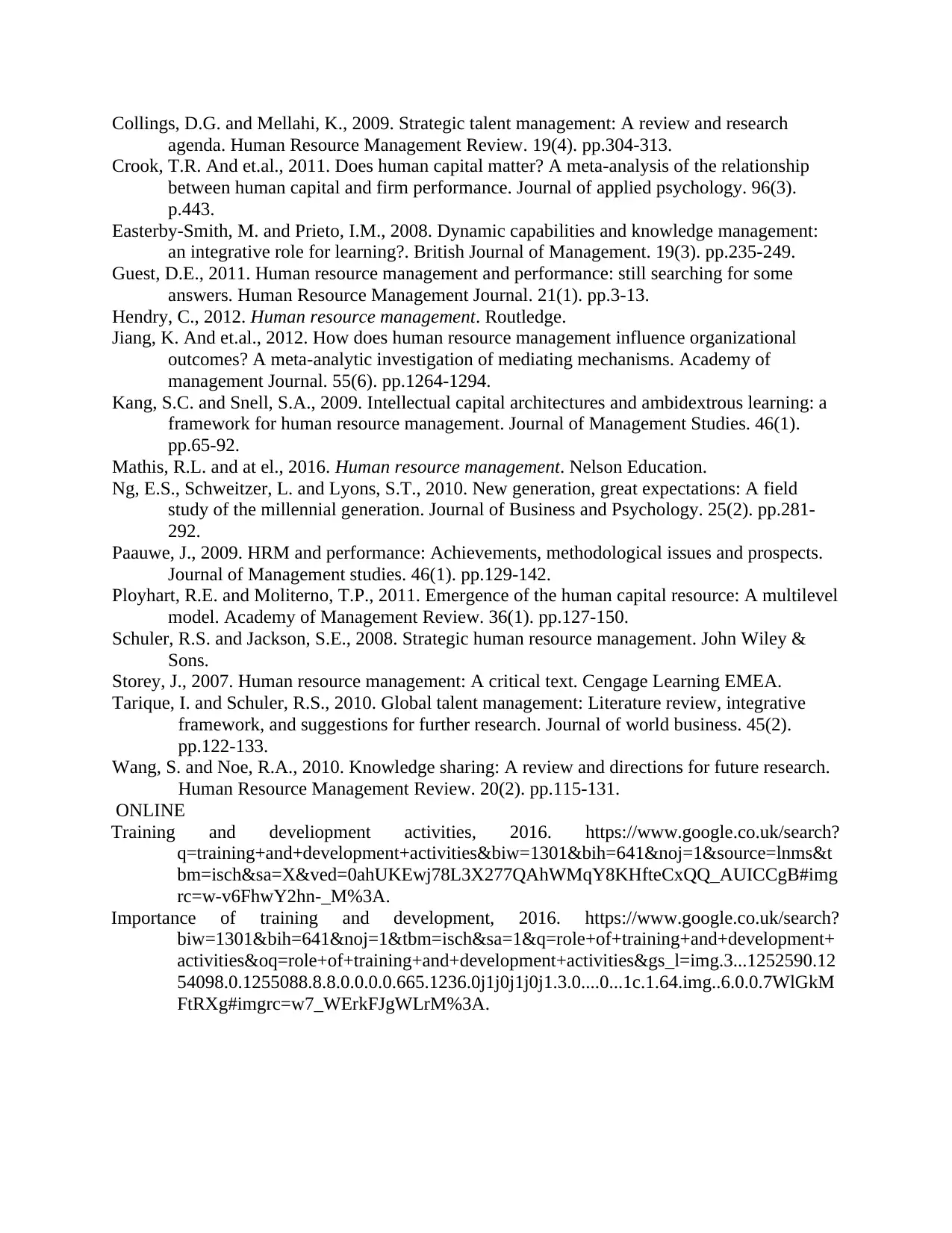
Collings, D.G. and Mellahi, K., 2009. Strategic talent management: A review and research
agenda. Human Resource Management Review. 19(4). pp.304-313.
Crook, T.R. And et.al., 2011. Does human capital matter? A meta-analysis of the relationship
between human capital and firm performance. Journal of applied psychology. 96(3).
p.443.
Easterby-Smith, M. and Prieto, I.M., 2008. Dynamic capabilities and knowledge management:
an integrative role for learning?. British Journal of Management. 19(3). pp.235-249.
Guest, D.E., 2011. Human resource management and performance: still searching for some
answers. Human Resource Management Journal. 21(1). pp.3-13.
Hendry, C., 2012. Human resource management. Routledge.
Jiang, K. And et.al., 2012. How does human resource management influence organizational
outcomes? A meta-analytic investigation of mediating mechanisms. Academy of
management Journal. 55(6). pp.1264-1294.
Kang, S.C. and Snell, S.A., 2009. Intellectual capital architectures and ambidextrous learning: a
framework for human resource management. Journal of Management Studies. 46(1).
pp.65-92.
Mathis, R.L. and at el., 2016. Human resource management. Nelson Education.
Ng, E.S., Schweitzer, L. and Lyons, S.T., 2010. New generation, great expectations: A field
study of the millennial generation. Journal of Business and Psychology. 25(2). pp.281-
292.
Paauwe, J., 2009. HRM and performance: Achievements, methodological issues and prospects.
Journal of Management studies. 46(1). pp.129-142.
Ployhart, R.E. and Moliterno, T.P., 2011. Emergence of the human capital resource: A multilevel
model. Academy of Management Review. 36(1). pp.127-150.
Schuler, R.S. and Jackson, S.E., 2008. Strategic human resource management. John Wiley &
Sons.
Storey, J., 2007. Human resource management: A critical text. Cengage Learning EMEA.
Tarique, I. and Schuler, R.S., 2010. Global talent management: Literature review, integrative
framework, and suggestions for further research. Journal of world business. 45(2).
pp.122-133.
Wang, S. and Noe, R.A., 2010. Knowledge sharing: A review and directions for future research.
Human Resource Management Review. 20(2). pp.115-131.
ONLINE
Training and develiopment activities, 2016. https://www.google.co.uk/search?
q=training+and+development+activities&biw=1301&bih=641&noj=1&source=lnms&t
bm=isch&sa=X&ved=0ahUKEwj78L3X277QAhWMqY8KHfteCxQQ_AUICCgB#img
rc=w-v6FhwY2hn-_M%3A.
Importance of training and development, 2016. https://www.google.co.uk/search?
biw=1301&bih=641&noj=1&tbm=isch&sa=1&q=role+of+training+and+development+
activities&oq=role+of+training+and+development+activities&gs_l=img.3...1252590.12
54098.0.1255088.8.8.0.0.0.0.665.1236.0j1j0j1j0j1.3.0....0...1c.1.64.img..6.0.0.7WlGkM
FtRXg#imgrc=w7_WErkFJgWLrM%3A.
agenda. Human Resource Management Review. 19(4). pp.304-313.
Crook, T.R. And et.al., 2011. Does human capital matter? A meta-analysis of the relationship
between human capital and firm performance. Journal of applied psychology. 96(3).
p.443.
Easterby-Smith, M. and Prieto, I.M., 2008. Dynamic capabilities and knowledge management:
an integrative role for learning?. British Journal of Management. 19(3). pp.235-249.
Guest, D.E., 2011. Human resource management and performance: still searching for some
answers. Human Resource Management Journal. 21(1). pp.3-13.
Hendry, C., 2012. Human resource management. Routledge.
Jiang, K. And et.al., 2012. How does human resource management influence organizational
outcomes? A meta-analytic investigation of mediating mechanisms. Academy of
management Journal. 55(6). pp.1264-1294.
Kang, S.C. and Snell, S.A., 2009. Intellectual capital architectures and ambidextrous learning: a
framework for human resource management. Journal of Management Studies. 46(1).
pp.65-92.
Mathis, R.L. and at el., 2016. Human resource management. Nelson Education.
Ng, E.S., Schweitzer, L. and Lyons, S.T., 2010. New generation, great expectations: A field
study of the millennial generation. Journal of Business and Psychology. 25(2). pp.281-
292.
Paauwe, J., 2009. HRM and performance: Achievements, methodological issues and prospects.
Journal of Management studies. 46(1). pp.129-142.
Ployhart, R.E. and Moliterno, T.P., 2011. Emergence of the human capital resource: A multilevel
model. Academy of Management Review. 36(1). pp.127-150.
Schuler, R.S. and Jackson, S.E., 2008. Strategic human resource management. John Wiley &
Sons.
Storey, J., 2007. Human resource management: A critical text. Cengage Learning EMEA.
Tarique, I. and Schuler, R.S., 2010. Global talent management: Literature review, integrative
framework, and suggestions for further research. Journal of world business. 45(2).
pp.122-133.
Wang, S. and Noe, R.A., 2010. Knowledge sharing: A review and directions for future research.
Human Resource Management Review. 20(2). pp.115-131.
ONLINE
Training and develiopment activities, 2016. https://www.google.co.uk/search?
q=training+and+development+activities&biw=1301&bih=641&noj=1&source=lnms&t
bm=isch&sa=X&ved=0ahUKEwj78L3X277QAhWMqY8KHfteCxQQ_AUICCgB#img
rc=w-v6FhwY2hn-_M%3A.
Importance of training and development, 2016. https://www.google.co.uk/search?
biw=1301&bih=641&noj=1&tbm=isch&sa=1&q=role+of+training+and+development+
activities&oq=role+of+training+and+development+activities&gs_l=img.3...1252590.12
54098.0.1255088.8.8.0.0.0.0.665.1236.0j1j0j1j0j1.3.0....0...1c.1.64.img..6.0.0.7WlGkM
FtRXg#imgrc=w7_WErkFJgWLrM%3A.
⊘ This is a preview!⊘
Do you want full access?
Subscribe today to unlock all pages.

Trusted by 1+ million students worldwide
1 out of 12
Related Documents
Your All-in-One AI-Powered Toolkit for Academic Success.
+13062052269
info@desklib.com
Available 24*7 on WhatsApp / Email
![[object Object]](/_next/static/media/star-bottom.7253800d.svg)
Unlock your academic potential
Copyright © 2020–2026 A2Z Services. All Rights Reserved. Developed and managed by ZUCOL.





